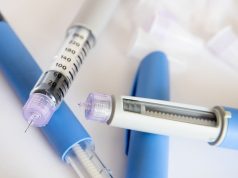Lower incidence of appropriate implantable cardiac defibrillator shock in patients with cardiomyopathy
FRIDAY, April 10, 2015 (HealthDay News) — For patients with cardiomyopathy, use of angiotensin-converting enzyme inhibitors (ACEi) and angiotensin receptor blockers (ARB) is associated with significantly lower incidence of appropriate implantable cardiac defibrillator (ICD) shocks, according to a study published in the April 1 issue of The American Journal of Cardiology.
Wael A. AlJaroudi, M.D., from the American University of Beirut Medical Center in Lebanon, and colleagues examined the role of ACEi or ARB use in preventing sudden cardiac death among patients with cardiomyopathy. Data were obtained for 1,509 patients, of whom 80 percent were on ACEi/ARB and 20 percent were not on ACEi/ARB. Five hundred seventy-four propensity-matched patients (287 in each group) were included in the analyses.
The researchers identified 334 appropriate implantable cardiac defibrillator shocks in the entire cohort over a mean of 2.5 years. At one, three, and five years, ACEi/ARB use correlated with lower incidence of shocks in the matched cohort (7.7, 16.7, and 18.5 versus 13.2, 27.5, and 32.0 percent, respectively; P = 0.005). Among patients with glomerular filtration rate (GFR) of >60 and 30 to 60 ml/min/1.73 m², the risk of ICD shock was increased by 45 and 77 percent, respectively, for those on no-ACEi/ARB versus those on ACEi/ARB.
“ACEi/ARB were associated with significant lower incidence of appropriate ICD shock in patients with cardiomyopathy and GFR ≥30 ml/min/1.73 m² and with neutral effect in those with GFR <30 ml/min/1.73 m²,” the authors write.
Copyright © 2015 HealthDay. All rights reserved.








